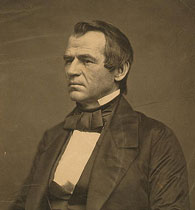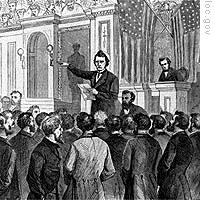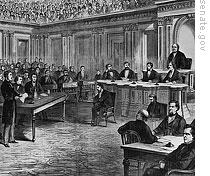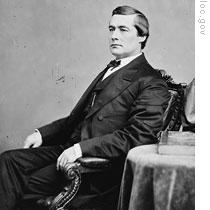2010-1-27
Welcome to THE MAKING OF A NATION -- American history in VOA Special English.
The Civil War ended in eighteen sixty-five. After that, tensions grew between Congress and the new president, Andrew Johnson.
The Republican Party was still new. It was formed to oppose slavery. Radical members of the party controlled Congress. They wanted strong policies to punish the southern states that left the Union and lost the war.
Standing in the way of the Republicans was Andrew Johnson, a Democrat. The president opposed radical efforts to force solutions on the South. He vetoed a number of programs that he thought interfered with rights given to the states by the Constitution.
This week in our series, Kay Gallant and Harry Monroe continue the story of President Andrew Johnson.
(MUSIC)
VOICE ONE:
 |
| Andrew Johnson |
This conflict between Johnson and the Congress caused much bitterness. Finally, the radicals decided to get him out of the way. For the first time in American history, Congress would try to remove the President from office.
Under the United States Constitution, the House of Representatives has the power to bring charges against the president. The Senate acts as the jury to decide if the president is guilty of the charges. The chief justice of the United States serves as judge.
If two-thirds of the senators find the president guilty, he can be removed from office.
VOICE TWO:
 |
| Thaddeus Stevens speaks during the debate over impeachment in the House of Representatives |
Most of the charges were based on Johnson's removal from office of his secretary of war. Radicals charged that this violated a new law. The law said the president could not remove a cabinet officer without approval by the Senate.
Johnson refused to recognize the law. He said it was not constitutional.
Radicals in the House of Representatives also charged Johnson with criticizing Congress. They said his statements dishonored Congress and the presidency.
(MUSIC)
VOICE ONE:
The great impeachment trial began on March fifth, eighteen sixty-eight. The president refused to attend. But his lawyers were there to defend him.
One by one, the senators swore an oath to be just. They promised to make a fair and honest decision on the guilt or innocence of Andrew Johnson.
A congressman from Massachusetts opened the case for the radicals. He told the senators not to think of themselves as members of any court. He said the Senate was a political body that was being asked to settle a political question. Was Johnson the right man for the White House? He said it was clear that Johnson wanted to overthrow Congress.
Other radical Republicans then joined him in condemning Johnson. They made many charges. But they offered little evidence to support the charges.
VOICE TWO:
Johnson's lawyers called for facts, instead of emotion. They said the Constitution required the radicals to prove that the president had committed serious crimes. Andrew Johnson had committed no crime, they said. This was purely a political trial.
They warned of serious damage to the American form of government if the president was removed for political reasons. No future president would be safe, they said, if opposed by a majority of the House and two-thirds of the Senate.
VOICE ONE:
 |
| The impeachment trial |
It soon became clear that the radicals had thirty-five of these votes. Only seven senators remained undecided. If one of the seven voted guilty, Johnson would be removed.
Radicals put great pressure on the seven men. They tried to buy their votes. Party leaders threatened them. Supporters in the senators' home states were told to write hundreds of letters demanding that Johnson be found guilty.
VOICE TWO:
A senator from Maine was one who felt the pressure. But he refused to let it force him to do what others wished. He answered one letter this way:
"Sir, I wish you and all my other friends to know that I, not they, am sitting in judgment upon the president. I, not they, have sworn to do impartial justice. I, not they, am responsible to God and man for my action and its results."
A senator from Kansas was another who refused to let pressure decide his vote. He said, "I trust that I shall have the courage to vote as I judge best."
VOICE ONE:
In the final days before the vote, six of the seven remaining Republican senators let it be known that they would vote not guilty. But the senator from Kansas still refused to say what his vote would be. His was the only vote still in question. His vote would decide the issue.
Now, the pressure on him increased. His brother was offered twenty thousand dollars for information about how the senator would vote. Everywhere he turned, he found someone demanding that he vote guilty.
The vote took place on May sixteenth. Every seat in the big Senate room was filled. The chief justice began to call on the senators. One by one, they answered guilty or not guilty. Finally, he called the name of the senator from Kansas.
VOICE TWO:
 |
| The vote of Senator Edmund Ross of Kansas saved the presidency of Andrew Johnson |
"It was like looking down into an open grave," he said later. "Friendship, position, wealth -- everything that makes life desirable to an ambitious man -- were about to be swept away by my answer."
He spoke softly. Many could not hear him. The chief justice asked him to repeat his vote. This time, the answer was clearly heard across the room: "Not guilty."
VOICE ONE:
The trial was all but done. Remaining senators voted as expected. The chief justice announced the result. On the first charge, thirty-five senators voted that President Johnson was guilty. Nineteen voted that he was not guilty. The radicals had failed by one vote.
When the Senate voted on the other charges, the result was the same. The radicals could not get the two-thirds majority they needed. President Johnson was declared not guilty.
(MUSIC)
VOICE TWO:
Radical leaders and newspapers bitterly denounced the small group of Republican senators who refused to vote guilty. They called them traitors. Friends and supporters condemned them. None was re-elected to the Senate or to any other government office.
It was a heavy price to pay. And yet, they were sure they had done the right thing. The senator from Kansas told his wife, "The millions of men cursing me today will bless me tomorrow for having saved the country from the greatest threat it ever faced."
VOICE ONE:
He was right. The trial of Andrew Johnson was an important turning point in the making of the American nation.
His removal from office would have established the idea that the president could serve only with the approval of Congress. The president would have become, in effect, a prime minister. He would have to depend on the support of Congress to remain in office. Johnson's victory kept alive the idea of an independent presidency.
However, the vote did not end the conflict between Congress and the White House over the future of the South.
That will be our story in the next program of THE MAKING OF A NATION.
(MUSIC)
ANNOUNCER:
Our program was written by David Jarmul and Frank Beardsley. The narrators were Kay Gallant and Harry Monroe. Transcripts, podcasts and historical images from our series are at 51voa.com. You can also comment on our programs. And you can follow us on Twitter at VOA Learning English. Join us again next week for THE MAKING OF A NATION -- an American history series in VOA Special English.
___
This is program #121 of THE MAKING OF A NATION